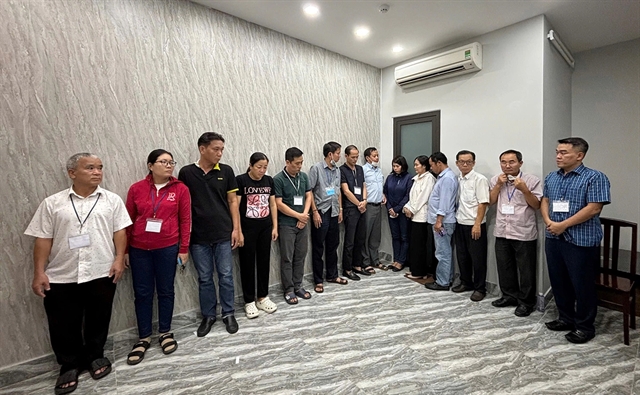 Society
Society


|
| (From left to right) Members of the EduExam project: Hoàng Mậu Trung, Nguyễn Thị Thanh Tâm and Nguyễn Văn Nam. Photo courtesy of EduExam/thanhnien.vn |
HÀ NỘI — As the fourth wave of the COVID-19 pandemic hit the country in 2021, students had to study and take exams online. However, cheating on online exams has caused headaches for schools.
To help schools prevent and discover cheating, a group of young alumni of the Posts and Telecommunications Institute of Technology invented a piece of software which can detect cheating in up to 80 per cent of cases.
Hoàng Mậu Trung, Nguyễn Thị Thanh Tâm and Nguyễn Văn Nam, all aged 24, built an online exam system named EduExam, using artificial intelligence technology.
According to Trung, the project leader, the EduExam online exam system can be used for all levels of education, from primary school to university, for multiple-choice to essay tests.
The system is easy to use and easy to install on computers and laptops. After successful research, this system has been applied at the Posts and Telecommunications Institute of Technology.
With the intelligent features, this system has helped schools monitor and mark exams.
Trung said during the COVID-19 pandemic, most schools had to switch to online learning and exams. However, it is difficult to monitor cheating when students are working remotely.
His team started building an online multiple-choice and essay exam system that still ensures fairness and convenience for both teachers and students.
"Currently, there is no software that fully supports an online exam. Our project is to create a professional online exam environment with typical functions such as creating exam rooms, assigning registration numbers, monitoring exams, and preventing cheating," Trung told Thanh Niên (Youth) newspaper.
The cheating detection software is employed to detect the presence of another person, electronic device usage, and if candidates are absent.
It also helps to detect unusual behaviour during the exam with eye and face direction detection.
The software can also detect human voice and sound, noise or the use of applications for fraud such as messaging or internet searches.
Students will also be detected when they take screenshots, copy and paste during the exams, Trung said, adding that the AI system also supports the monitoring of keyboard and mouse movements, helping to prevent revealing exam content to other people.
The authors also said that the software can make marking exams more convenient.
“In particular, it is not only applied in online exams but can be integrated into live exam monitoring devices to detect fraud. For both online and in-person exams, the software acts as an exam invigilator, notifying observers of any cheating in the exam,” Trung said.
Master Vũ Hoài Nam, lecturer at the Faculty of Information Technology of the Posts and Telecommunications Institute of Technology, said the intellectual product made by the young people has had practical effects.
The EduExam software has been applied in a number of online exams of the school and received positive feedback from teachers.
"The system will notify if it detects any cheating in the exam and the automatic exam grading also helps to reduce a lot of effort for teachers," said Nam.
He said if the software continues to be properly researched and widely applied, it will become an useful product for society, contributing to digital transformation in education. — VNS




